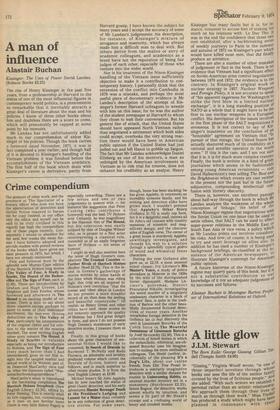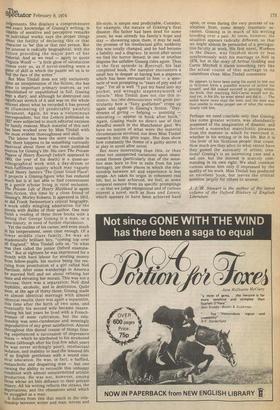A little glow
J.I.M. Stewart
The Born Exile: George Gissing Gillian Tindall (Temple Smith £4.00) "Gissing," Virginia Woolf wrote, "is one °f those imperfect novelists through whose books one sees the life of the author faintly covered by the lives of fictitious people." An° she added: "With such writers we establish a personal rather than an artistic relations1111); We approach them through their lives af, much as through their work." Miss Tindal' has produced a study which might have been planned in consonance with these judgements. She displays a comprehensive and exact knowledge of Gissing's writing; is capable of sensitive and perceptive remarks on individual works; says the proper things about the futility of declaring this or that Character to 'be' this or that real person. But her interest is radically biographical, with the fiction providing the major part of her material. And as we read — again to quote Virginia Woolf — "a little glow of satisfaction Comes over us, as if novel-reading were a game of skill in which the puzzle set us is to find the face of the writer."
But Miss Tindall does not rely exclusively uPon an interpretation of the fiction; she has gone to important primary sources, as yet unpublished or unpublished in full. Gissing kept a diary, and although he destroyed one Significant stretch of it and was on the whole reticent about what he recorded it has proved an illuminating (if predictably painful) document. Again, he was a voluminous correspondent, but the Letters published in 1927 were subjected to much editorial excision for family reasons. Much material of this sort has been worked over by Miss Tindall with the most evident thoroughness and skill.
The labour has been the more valuable in that there happens to be something curiously equivocal about three of the main published sources for Gissing's life. His own The Private Papers of Henry Ryecroft (which appeared in 1903, the year of his death) is a quasi-autobiographical work with a day-dream or Wish-fulfilment quality which may vaguely recall Henry James's 'The Great Good Place': it projects a Gissing-figure who has endured much but is at last able to find contentment as a gentle scholar living in rural seclusion. The Private Life of Henry Maitland is again semi-fiction, this time by a close friend of Gissing's, Morley Roberts. It appeared in 1912, as did Frank Swinnerton's critical biography, a work oddly mingling admiration for the novels with dislike of their author. One may finish a reading of these three books with a feeling that George Gissing is a man, or a case-history, in need of further elucidation. Yet the outline of his career, and even much in his temperament, seem clear enough. Of a lower middle class family, he was an academically brilliant boy, "coming top over all England," Miss Tindall tells us, "in what Was then called the junior Oxford examination." But at eighteen he was imprisoned for a Month with hard labour for stealing money from fellow-pupils, his motive being the rescuing from prostitution of a girl called Nell Harrison. After some wanderings in America he married Nell and set about refining her taste and elevating her morals. This was not a success; there was a separation; Nell died Syphilitic, alcoholic, and in destitution. Quite soon, at the age of thirty-three, Gissing made an almost identical marriage with almost identical results; there was again a separation, this time after the birth of two sons, and eventually his second wife became insane. pouring his last years he lived with a Frenchwoman of some Cultivation, but the relationship was semi-clandestine and seemingly. unproductive of any great satisfaction. Almost throughout this dismal course of things Gissing experienced a succession of depressive states — which he attributed to his straitened means (although after his first few adult years he was never strikingly poor), intellectual isolation, and inability to lead the leisured life of an English gentleman with a sound classical education. He was, in fact, a baffled, melancholic and despairing man — but one owning the ability to reconcile this unhappy Condition with almost unintermitted artistic Production. He was not, however, among those whose art bids defiance to their private Misery. All his writing reflects the strains, the deprivations, and the obsessions amid which he struggled as a man.
It follows from this that much in the relationship between writer and man, novels and life-style, is simple and predictable. Consider, for example, the nature of Gissing's first disaster. His father had been dead for some years; he was already his family's hope and stay — showering upon them, it may be said, the promise of his intellectual gifts; suddenly this was totally changed, and he had become a liability and a disgrace. In novel after novel we find the horror denied; in one or another disguise the unfallen Gissing rides again. Thus in the first episode in Ryecroft, his last completed book, the narrator encounters a small boy in despair at having lost a sixpence which has been entrusted to him — a spectacle of woe prompting to "tears of pity and of rage." Yet all is well. "I put my hand into my pocket, and wrought sixpennyworth of miracle." Miss Tindall does not cite this instance, but she ,demonstrates with great particularity how a "fairy godfather" crops up again and again in Gissing's fiction. "Daydreams of giving — helping — assisting — educating — appear in book after book." Again, Gissing made no direct use of that dreadful month in the Manchester gaol. We have no notion of what were the material circumstances involved, nor does Miss Tindall research into this grim topic. She does show how constantly the theme of a guilty secret is at play in novel after novel.
But more interesting than this, or than other not unexpected variations upon obsessional themes (particularly that of the sensitive man born to live in exile from his just heritage), are those places in which the relationship between art and experience is less simple. Art takes its origin in vehement real life, but is best achieved, we feel, at some temporal remove from its specific promptings — so that we judge exceptional and of curious interest a novel, such as Sons and Lovers, which appears to have been achieved hard upon, or even during the very process of extrication from, some deeply traumatic occasion. Gissing is in much of his writing brooding over a past. At times, however, the situation appears radically different, so that we might almost be persuaded of a precognitive faculty at work. His first novel, Workers in the Dawn, was finished more or less synchronously with his marriage to Nell in 1879, but in the story of Arthur Golding and Carrie Mitchell it traces something very like the actual course of that marriage to its calamitous close. Miss Tindall comments:
He appears to have been using his novel to test out in fictional form a possible source of action for himself, and did indeed succeed in proving, within the book, that marrying Nell-Carrie would not do. And yet, in his life, he went ahead and did it ... The writer knew more than the man, and the man was thus unable to make proper use of what the writer clearly told him.
Perhaps we need conclude only that Gissing, like some greater writers, was abundantly possessed of the imagination of disaster, and derived a somewhat masochistic pleasure from the manner in which he exercised it, whether in his writing or in his life. But it is 'the lives' of his 'fictitious people' that count. How much are they alive; to what extent have • they gained the autonomy of artistic creations? Gissing's is an interesting case and a sad one, but the interest is scarcely commanding in its own right. We shall continue curious about him only if impressed by the quality of his work. Miss Tindall has produced an excellent book, but leaves the critical question largely for others to answer.
J. I. M. Stewart is the author of the latest volume of the Oxford History of English Literature.



































 Previous page
Previous page